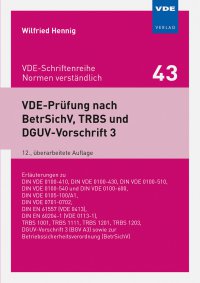IEC 61496-2:2020
Safety of machinery - Electro-sensitive protective equipment - Part 2: Particular requirements for equipment using active opto-electronic protective devices (AOPDs)
Ausgabedatum:
2020-07
Edition:
4.0
Sprache: EN-FR - zweisprachig englisch/französisch
Seitenzahl: 95 VDE-Artnr.: 248969
IEC 61496-2:2020 specifies requirements for the design, construction and testing of electro-sensitive protective equipment (ESPE) designed specifically to detect persons as part of a safety-related system, employing active opto-electronic protective devices (AOPDs) for the sensing function. Special attention is directed to features which ensure that an appropriate safety-related performance is achieved. An ESPE can include optional safety-related functions, the requirements for which are given in Annex A of IEC 61496-1:2020 and of this document.
This document does not specify the dimensions or configurations of the detection zone and its disposition in relation to hazardous parts for any particular application, nor what constitutes a hazardous state of any machine. It is restricted to the functioning of the ESPE and how it interfaces with the machine.
Excluded from this document are AOPDs employing radiation at wavelengths outside the range 400 nm to 1 500 nm.
This document can be relevant to applications other than those for the protection of persons, for example, the protection of machinery or products from mechanical damage. In those applications, additional requirements can be necessary, for example, when the materials that are to be recognized by the sensing function have different properties from those of persons.
This document does not deal with electromagnetic compatibility (EMC) emission requirements.
IEC 61496-2:2020 cancels and replaces the third edition published in 2013. This edition constitutes a technical revision.
This edition includes the following significant technical changes with respect to the previous edition:
a) Requirements and test procedures in Part 2 that were found to be common to all ESPEs have been moved to Part 1. Test procedures that are dependent on the sensing technology remain in Part 2.






